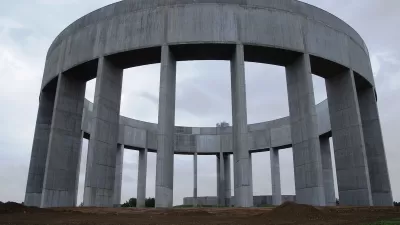Researchers are beginning to understand how the human brain is hard-wired to respond to certain patterns, colors, and proportions. The result is "a revolution in the science of design," says Lance Hosey, and "most people...aren’t even aware of it."
German researchers have shown that "shades of green can boost creativity and motivation;" a Duke University professor has demonstrated the rationale behind the "golden rectangle;" and "optimal fractal density" may explain the appeal of Jackson Pollock's paintings. Hosey, the chief sustainability officer at the architecture firm RTKL, discusses "why we love beautiful things" in this essay for The New York Times.
"It should come as no surprise that good design, often in very subtle ways, can have such dramatic effects. After all, bad design works the other way: poorly designed computers can injure your wrists, awkward chairs can strain your back and over-bright lighting and computer screens can fatigue your eyes."
"We think of great design as art, not science, a mysterious gift from the gods, not something that results just from diligent and informed study. But if every designer understood more about the mathematics of attraction, the mechanics of affection, all design — from houses to cellphones to offices and cars — could both look good and be good for you."
FULL STORY: Why We Love Beautiful Things

Alabama: Trump Terminates Settlements for Black Communities Harmed By Raw Sewage
Trump deemed the landmark civil rights agreement “illegal DEI and environmental justice policy.”

Planetizen Federal Action Tracker
A weekly monitor of how Trump’s orders and actions are impacting planners and planning in America.

The 120 Year Old Tiny Home Villages That Sheltered San Francisco’s Earthquake Refugees
More than a century ago, San Francisco mobilized to house thousands of residents displaced by the 1906 earthquake. Could their strategy offer a model for the present?

Ken Jennings Launches Transit Web Series
The Jeopardy champ wants you to ride public transit.

BLM To Rescind Public Lands Rule
The change will downgrade conservation, once again putting federal land at risk for mining and other extractive uses.

Indy Neighborhood Group Builds Temporary Multi-Use Path
Community members, aided in part by funding from the city, repurposed a vehicle lane to create a protected bike and pedestrian path for the summer season.
Urban Design for Planners 1: Software Tools
This six-course series explores essential urban design concepts using open source software and equips planners with the tools they need to participate fully in the urban design process.
Planning for Universal Design
Learn the tools for implementing Universal Design in planning regulations.
Clanton & Associates, Inc.
Jessamine County Fiscal Court
Institute for Housing and Urban Development Studies (IHS)
City of Grandview
Harvard GSD Executive Education
Toledo-Lucas County Plan Commissions
Salt Lake City
NYU Wagner Graduate School of Public Service




























